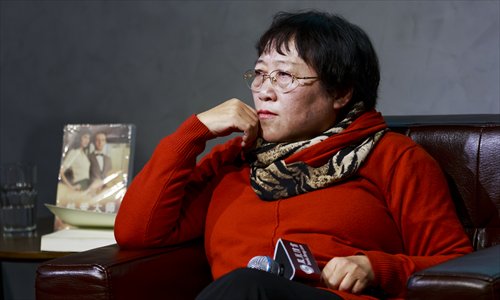Freedom fighter
Famous sexologist advocates tolerance for LGBT community

Li Yinhe Photo: IC

Chinese cover for An Atheist's Meditation Photo: Xu Ming/GT
When speaking of Li Yinhe, a sociologist well known for her work as a sexologist and identity as the widow of late writer Wang Xiaobo, an image of an aggressive feminist with pioneering outlooks on sex is probably the first thing to pop up in many people's minds. Her revelation of her relationship with a transsexual woman last year only added more fuel to the controversies surrounding this woman, further divorcing herself from the sacred image brought about by her romance and marriage with Wang.
What goes on in the mind of the woman behind the chaos and controversy? Li provides readers some clues to her inner world in her recently published book An Atheist's Meditation. Her first book after her relationship with her transsexual lover was revealed, the book demonstrates a different side of the sociologist - a woman troubled by different philosophical ideas about human existence - while also explaining her life as it is today.
Ultimate questions
Judge from the title, this is a serious book that talks about philosophy and discusses big issues like life and death. Declaring herself an atheist, Li starts with religion and belief, after which she turns to the discussion of spiritual practices in an earthly world, a major point in her book. She goes on to discuss life, the meaning of a human existence and of course, death.
Now in her 60s, Li devotes several pages talking about death (also mentioning the death of her late husband), and how to face it when it comes around. But the discussion here eventually ends up discussing how to live a better life when faced with the inevitability of death. "We'd better think about death often while alive… and let the true scenario after death decide my goals and lifestyle while alive."
Mentioning Henry David Thoreau and Walden Pond several times, Li writes that she admires his serene and detached lifestyle and regards it as "heaven." Admitting that she's been heading in this direction herself, though with difficulty, she reveals her life goal is to "make her life a piece of delicate art work." To her, "the whole meaning of life is to spend everyday happy and meaningfully, while making the most of our short time on earth."
Reading through the pages, I could see a woman who, though inevitably trapped by the trivialities of life, persistently pursued a higher spiritual ideal by constantly reflecting on her own life and making adjustments when necessary. Unlike many who have grown numb from gyroscope-like endless cycles we face in life, she remain conscious of her own existence and struggles to do better.
Revealing her inner self, the book is mainly a monologue to herself, sometimes showing confusion, asking questions and sometimes repeating her views as a means to reassure her conviction. However, if you have ever had similar thoughts, you may feel like she is talking to and advising you as well.
Freedom and love
A keyword running throughout the book is "freedom," whether talking about the meaning of life or human relations.
In one essay titled "Freedom and Choice," Li explains her understanding of freedom, particularly in a modern society that has all kinds of rules and conventions. "A free person needs to have the courage to challenge the rules when necessary. Only by breaking the rules can one gain real freedom."
To stress her point, she cites French writer Marguerite Yourcenar, who disregarded the rules about love to happily live together with another woman for 40 years.
"[We should] feel free to do what we like and to love the people that we like, and to choose the lifestyle that favors us," Li writes, to herself and also to readers.
As the first female sexologist in China, Li's avant-garde ideas about sex, same-sex marriage or one-night stands, for instance, have been regarded as a challenge to many people's conservative views on sex. In addition, her relationship with her transsexual lover has led to even more controversy.
Li doesn't mention the controversy in the book, but she talks about love, platonic relationships, sex, repression, pressure from the secular world and most importantly, freedom. Whether talking about sex or minority groups such as the LGBT community, Li advocates freedom and tolerance, based on respect for their freedom of choice.
Although Li does not specifically mention anything about her work or personal life, the book somehow is still able to help readers understand this woman better.
Of course, Li herself doesn't seem to care what others may think of her. In her last essay in the book, she writes that her only wish is to just say what she wants to say, regardless of the consequences.